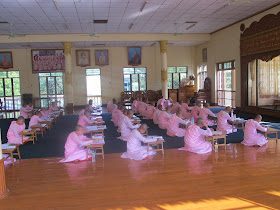Wednesday, 25 February 2015
"Why do young Burmese girls become novice nuns?"
"Why do young Burmese girls become novice nuns?"
The truth is that many young girls join the Order out of economic necessity. Anecdotally, one Burmese lay supporter estimated that only one child out of ten chooses to wear robes from her own volition. Ma Thanegi agrees with this assessment. “They don't choose to be nuns,” she says. “Here I'm talking about female children, not late teen girls. They may be orphaned or abandoned by poor parents.”
Paradoxically, there are also many well-known stories of middle-class young girls who feel a great volition towards the Holy Life, but their family tries to veer them towards more traditional careers. As the above-mentioned lay supporter goes on to share, “even when the person is 30 or more years old, the family members have great difficulty allowing the ordination-- and even though they allow it, they weep during the ceremony.”
This was true for one Burmese nun who had been meditating at Pa Auk for some time as a lay woman. She had wanted to become a nun from a young age, but her parents persuaded her to first get her University degree. She did this, but immediately came to live at Pa Auk after this, for she sought spiritual development. Then, she wished to study Pali and Buddhist scriptures, so she decided to enter a nunnery, to which her family finally gave her permission.
Ma Thanegi agrees with the basic assessment that many who come to nunnery do so because of external circumstances. She notes, “unfortunately most women who enter nunhood are those who could not face the problems of secular life so they are by nature timid.” She feels that many women may temporarily wear the robes as a way of gaining merit. Additionally, it is an excellent way to learn about the Buddha’s teachings at a much deeper level. “A few of my schoolmates from wealthy families were put into nunneries every summer holidays as little nuns so that they would know more of Buddhism. They liked it apart from going back to school with shaved heads.” For those remaining in robes for life not out of economic or personal hardships, merit also plays a major role, according to U Sarana. “This is why their lifestyle revolves around religious activities, helping others, serving monks, etc.”

No comments:
Post a Comment